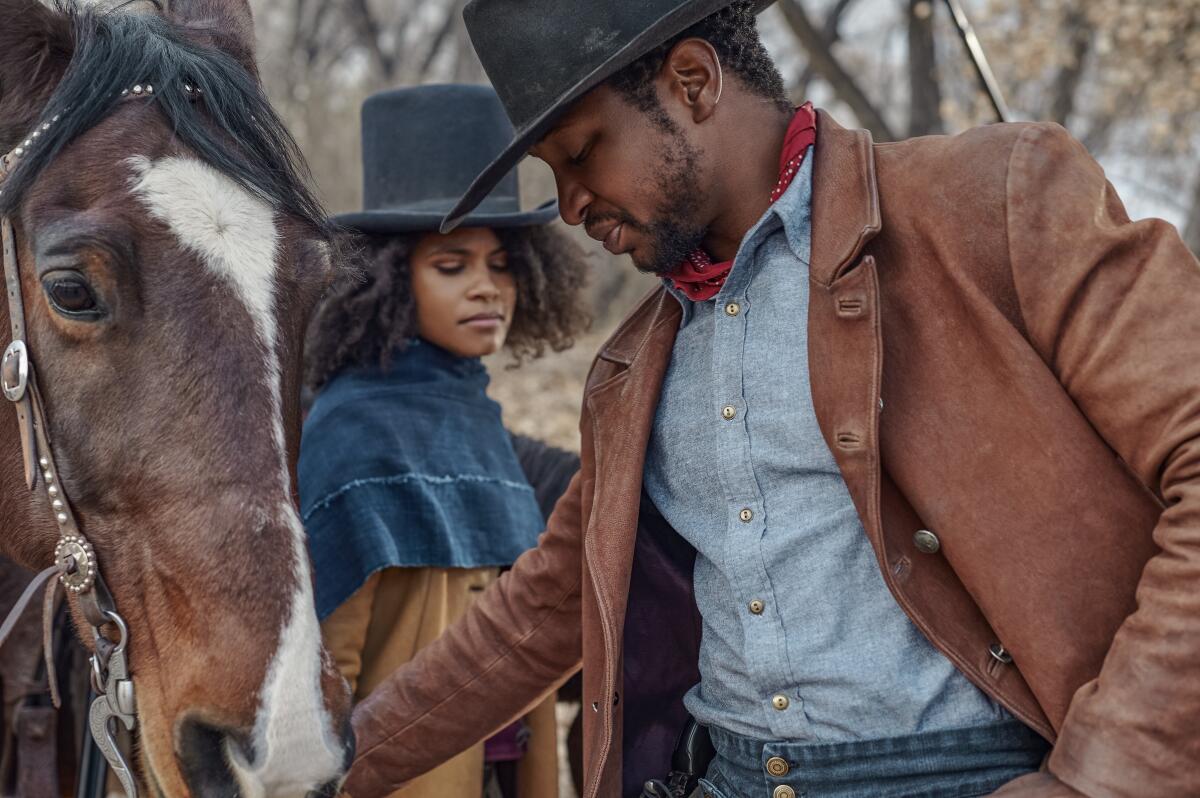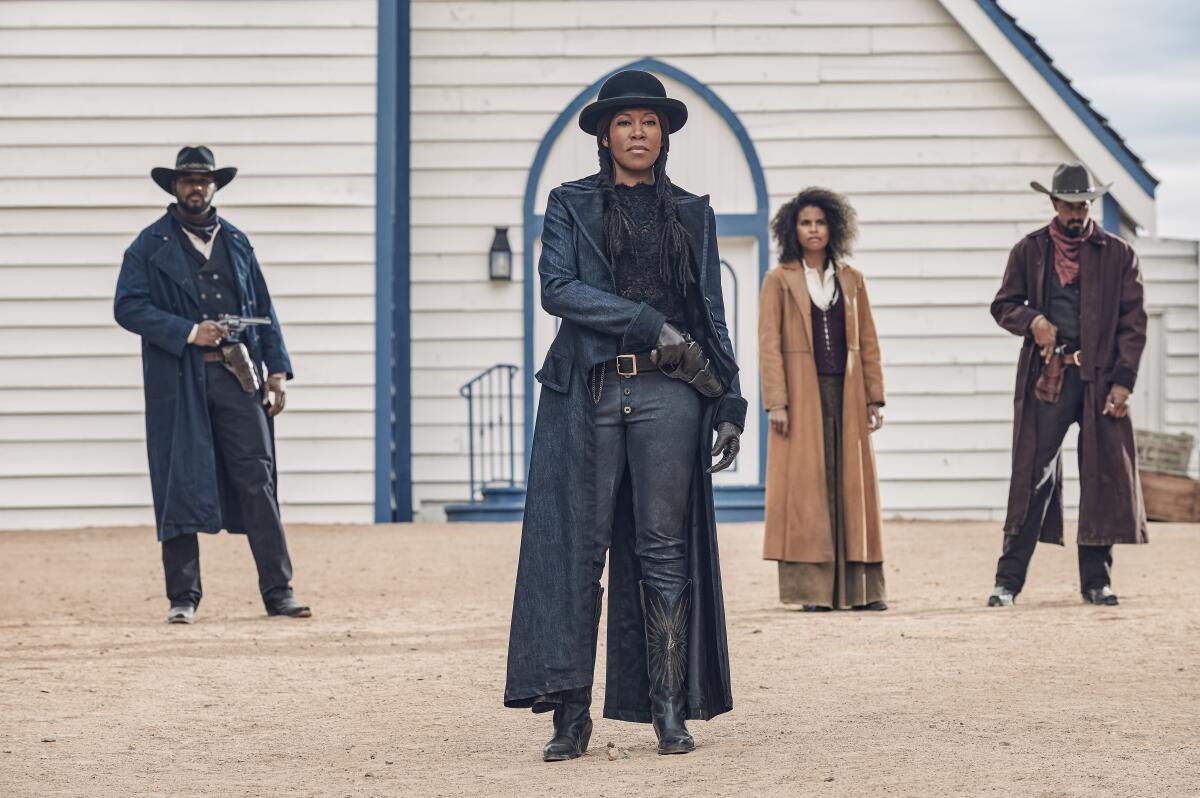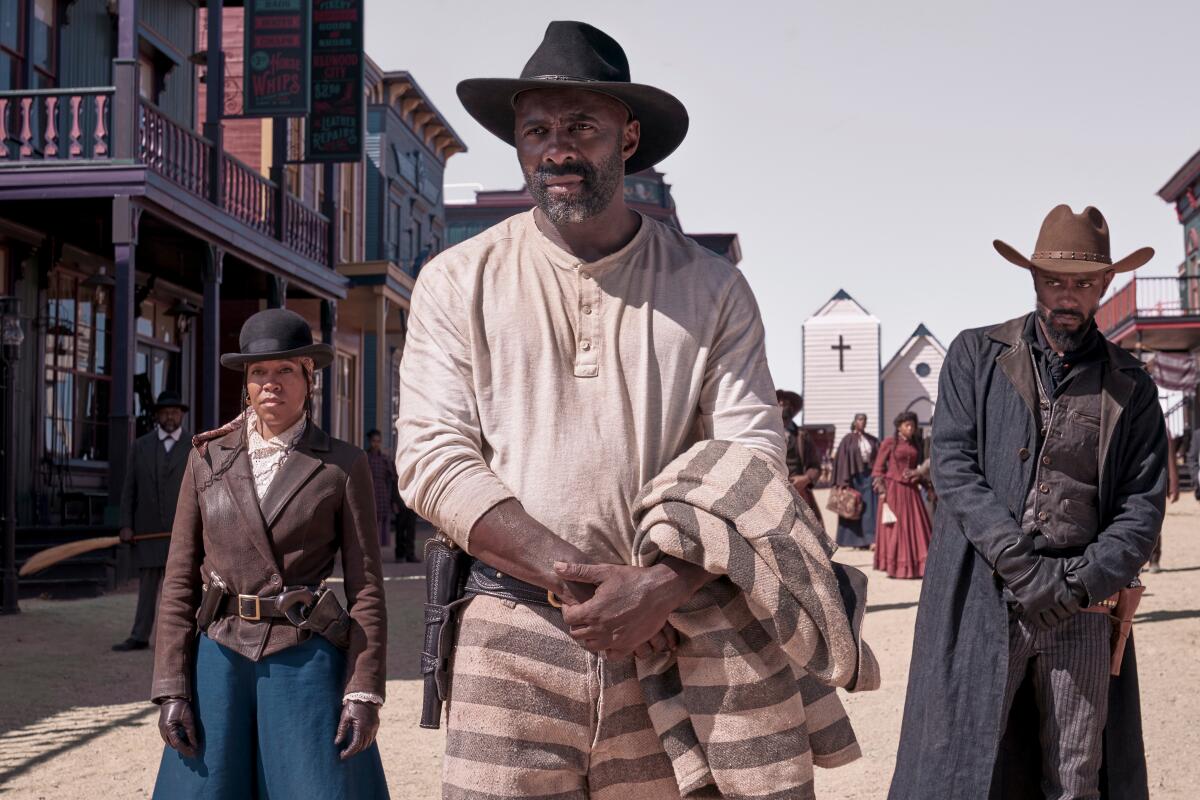Review: Netflix’s starry Black western ‘The Harder They Fall’ is both a dazzler and a muddle

- Share via
The Times is committed to reviewing theatrical film releases during the COVID-19 pandemic. Because moviegoing carries risks during this time, we remind readers to follow health and safety guidelines as outlined by the Centers for Disease Control and Prevention and local health officials.
“While the events of this story are fictional … These. People. Existed.” So begins “The Harder They Fall,” with an intriguing setup and enough jarring punctuation to drive home that you’re watching (ahem) a period picture. And as if it were taking its cue from all those full stops, this historical western fantasia unfolds at its own disorienting stop-and-go rhythm. When the outlaw Nat Love (Jonathan Majors) settles a score in the opening moments, he shoots his man four times and occasions four blood-spattered freeze-frames, each one bearing a word from the movie’s fatalistic title.
For dramatic purposes, Nat is the most significant of those fact-based, fictionalized gunslingers, a Black cowboy legend who was born to enslaved parents on a Tennessee plantation in 1854. Playing fast and loose with history, British writer-director Jeymes Samuel and his co-writer, Boaz Yakin, have given their Nat a very different if no less traumatic origin story. As a young boy (played by Anthony Naylor Jr.), he loses his family in spectacularly brutal fashion, setting the story’s long-simmering revenge plot in motion; years later, he and his trusty gang find themselves tracking his parents’ assassin, the vicious outlaw Rufus Buck (Idris Elba). Rufus runs with a gang of his own, only one that’s bigger, nastier and heavier on Hollywood royalty.

Not that “The Harder They Fall,” which opens this week in theaters before arriving Nov. 3 on Netflix, is generally lacking in celebrity. Its sprawling cast, recently announced as the winner of a Gotham Awards ensemble tribute prize, sets up a dazzling standoff between established stars and stars in the making. LaKeith Stanfield plumbs new depths of sotto voce silkiness as Cherokee Bill, the quickest of quick-draw artists. Regina King rocks a bowler hat as Gertrude “Treacherous Trudy” Smith, who’s not much slower. (Her first act here is to kill a white man before he can finish uttering a racist epithet.) As the Rufus Buck Gang’s MVPs, they’re an exceptionally magnetic pair of villains, with a bad-cop/badder-cop routine that’s good for a few queasy chuckles before the killing starts.
Their enemies on the Nat Love Gang side include the irrepressible Jim Beckwourth (R.J. Cyler), who shoots almost as well as he shoots off his mouth, and who maintains a nicely bickersome rapport with trusty comrade Bill Pickett (Edi Gathegi). A flinty-eyed Zazie Beetz throws a punch and swings a rifle as Stagecoach Mary, who in real life was the first Black woman to work for the U.S. Postal Service; here she’s been squeezed into the less interesting role of Nat’s erstwhile love interest. Another real-life pioneer is the deputy U.S. Marshal Bass Reeves, though his accomplishments are more hinted at than expounded on in Delroy Lindo’s charismatic growl of a performance.
Holding this scrappy but dependable crew together is Nat, played with sly, understated wit by Majors, who came to indie film prominence in “The Last Black Man in San Francisco” and recently earned an Emmy nomination for “Lovecraft Country.” What that HBO series did for Jim Crow-era horror/science fiction is more or less adjacent to what “The Harder They Fall” means to do for the 19th century western: to pick up the long, rich and frequently obscured threads of Black history and restore them, by imaginative means if necessary, to a genre from which they have been summarily removed. Vengeance may drive this movie’s narrative engine, but Samuel is after another kind of cinematic restitution (a process that began with his 2013 western “They Die by Dawn,” a 51-minute test drive for this project).

Fans of this gleefully ahistorical meta-movie revisionism may detect the superficial influence of Quentin Tarantino in Samuel’s fondness for 12-letter expletives, flashy shooting techniques and attenuated rhythms, which alternate between long stretches of dialogue and eruptions of bone-crunching violence. But the controversy and skepticism that have greeted Tarantino’s powder-keg treatment of race are unlikely to surface here. Unlike, say, “Django Unchained,” “The Harder They Fall” makes not even the barest of narrative concessions to whiteness; set well after the abolition of slavery, it treats its white characters not as scene-stealing villains but as bumbling non-entities. (They’re also the butt of a sharp visual gag I won’t spoil here, beyond crediting the ingenuity of Martin Whist’s production design.)
Old-school cinema buffs, meanwhile, will have fun spotting homages to the significant but under-seen canon of Black westerns, such as Sidney Poitier’s “Buck and the Preacher” (1972), whose bank robbery scene gets a playful echo here, and Mario Van Peebles’ “Posse” (1993), which mounted its own starry corrective to the genre’s whitewashed history. But “The Harder They Fall” has its own vibrantly contemporary sensibility, evident in the bright-hued digital sheen of Mihai Mälaimare Jr.’s images and the wide-ranging musical idioms deployed by Samuel, better known as the singer-songwriter and music producer The Bullitts. Working with Shawn Carter, aka Jay-Z (who’s credited as a producer), he weaves in several well-chosen Afro-Caribbean and hip-hop tracks that brilliantly defamiliarize our sense of a classic western soundscape.
These aesthetic pleasures supply considerable moment-to-moment excitement. I wish they were enough to make “The Harder They Fall” a movie as good as its intentions deserve, to carry it over its patchy stretches and lapses in momentum. I’ve tried to avoid dwelling at length on the plot, mainly to avoid duplicating the movie’s mistake, but it plays like a jam-up of familiar set-pieces — an epic train robbery, a few bank holdups and several bloody street fights en route to a climactic shootout — that complicate the surface of a fairly simple, even simplistic, gang-vs.-gang setup. And with so many real-life figures jostling for attention, the departures from the historical record, rather than liberating the movie’s imagination, wind up feeling oddly arbitrary. Surely the truth (or something close to it) of who these men and women were must have been more fascinating, and more worth mythologizing, than what transpires in this strained mashup.
There are exceptions, none more memorable than Cuffee (a ferociously expressive Danielle Deadwyler), a skilled fighter inspired by Cathay Williams, who famously passed herself off as a man and enlisted in the U.S. Army. Tagging along with the Nat Love Gang, Cuffee is the character who conforms least to expectations and, perhaps for that reason, the one who most fully satisfies them. She reminds you of all the stories that haven’t been told — and leaves you wishing that this arrestingly showy, fitfully involving movie had spent more time telling hers.
‘The Harder They Fall’
Rated: R, for strong violence and language
Running time: 2 hours, 17 minutes
Playing: Starts Oct. 22 in limited release; also available Nov. 3 on Netflix
More to Read
Only good movies
Get the Indie Focus newsletter, Mark Olsen's weekly guide to the world of cinema.
You may occasionally receive promotional content from the Los Angeles Times.











